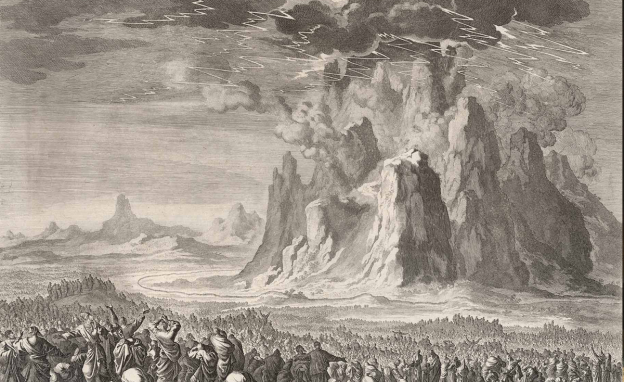If Lockdowns taught us anything, it is that while online presence with others is better than nothing, physical presence is far better. Being cut off from each other taught us to yearn for each other’s presence. But how much better than presence with each other must presence with God be like?
In this passage, the covenant ratification ceremony is completed by Israel’s representatives enjoying fellowship with God. Then, following their return down the mountain, Moses ascends again to commune further with God, enjoying his presence. In these events, we see not only the mirror of the sacrament of communion, but also the great and glorious presence of God we will all enjoy in eternity.
After sprinkling the people of Israel with blood, Moses and the representatives of Israel fulfil God’s command in verse one to go up on Mount Sinai to worship God. There, they see God (vv.9-10).
The description given is not of God as he is, but rather of the area around, reflecting his glory and majesty. “There was under his feet as it were a pavement of sapphire stone, like the very heaven for clearness” (v.10).
What they saw, little as it was, was beyond ability to properly explain. Beneath the anthropomorphic feet of God (God is spirit and does not have a body like us), the ground looked like it was paved with beautiful bright stones, reflecting God’s glory. At the same time, it was so pure as to be like heaven itself, reflecting God’s purity.
Perhaps they never even saw more of God than this. Experiencing his majesty and awe, they fell to the ground worshiping God and studied the floor rather intently!
Gathered on the mountain, the representatives of Israel completed the covenant ratification ceremony by communing with God.
Ordinarily, as sinners like us, the representatives of Israel were subject to judgement from God. But this was not their fate, because God had entered into a relationship of mercy and forgiveness with them.
Instead, God “did not lay his hand on the chief men of the people of Israel” (v.11). God did not strike them down where they knelt. He accepted their presence, and their worship of him, as part of his chosen people.
The representatives “beheld God, and ate and drank” (v.11). They shared a meal, which ratified the covenant relationship between God and Israel. This was an important custom of covenant ceremonies at that time. After this, we infer, they descended from the mountain back to God’s People.
After the ceremony, Moses once again enters God’s presence. This time, Moses ascends to receive the stone tablets of the covenant, and further instructions on building the tabernacle (v.12).
Anticipating that he would be with God for some time, Moses placed Aaron and Hur in charge with the elders (v.14), and ascended the mountain with his assistant Joshua (v.13). At this point the mountain was obscured by clouds (v.15), and God’s glory covered the mountain (v.16).
God’s glory settled on the mountain for six days, mirroring the creation story where God’s spirit hovered over the earth for six days, making everything (v.16; Gen. 1). A new creation is occurring; God is making a people for himself.
Viewed from down below, “the appearance of the glory of the LORD was like a devouring fire on the top of the mountain” (v.17). We do not know what Moses and Joshua observed at the edge of the glory cloud, but Moses responded to God’s call to go into the cloud (v.16) and entered into God’s intimate presence (v.18). There he stayed for forty days and nights (v.18), seeing God and communing with him.
The communion meal which the elders and leaders of Israel shared with God on Sinai is repeated at the Last Supper, where Jesus instituted what we call Communion or the Lord’s Table (Matt. 26:28-9). There, he announced the New Covenant (in comparison to the Covenant at Sinai), the new administration by which God relates to his people.
Whenever we gather together as a Church and take Communion together, we are entering into the same type of ceremony as the elders of Israel. We are identifying ourselves as part of God’s covenant people, against whom God does not lay a hand in judgement but extends his arms in loving mercy.
While we do not see God with our eyes in Communion, but enjoy his presence by the Holy Spirit, one day we will see God in fuller measure.
Revelation teaches that one day, not just the elders of our congregation but we all will gather at God’s feet, offering praise and worship to him (Rev. 7). There, in the new heaven and earth which God will make, we will commune with God in the marriage supper of the Lamb (Rev 19:6-9, cf. Isaiah 25:6-9) and enjoy his presence more fully than now, more fully even than the representatives of Israel on the slopes of Mount Sinai.
Because of Christ, we will see God and enjoy his glorious presence.

